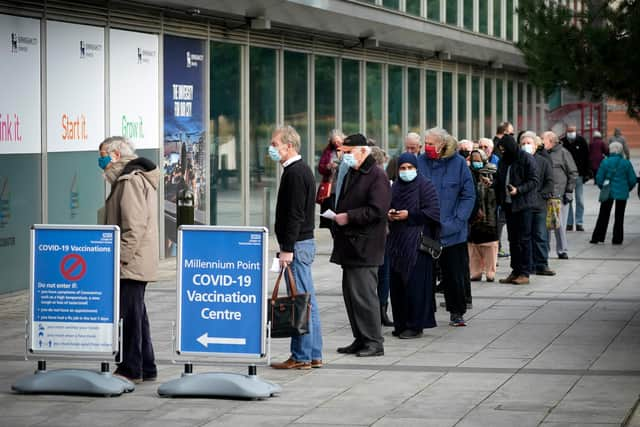What is herd immunity? Meaning of term, will UK reach threshold - and how Matt Hancock responded to UCL claims
The UK is expected to pass the threshold for Covid-19 herd immunity by Monday (12 April), according to modelling by University College London (UCL).
Research from UCL suggests that the number of people protected against coronavirus, either from having a vaccine or because they are naturally immune from a previous infection in the last six months, will reach 73.4 per cent on 12 April.
Advertisement
Hide AdAdvertisement
Hide AdThe forecast from UCL stands in contrast to the outlook given by the Scientific Advisory Group for Emergencies (Sage), which warned that a complete lifting of lockdown restrictions in June could trigger a third wave of hospitalisations over the summer.


What is herd immunity?
Herd immunity is achieved when the vast majority of a population becomes infected with a virus to prevent it spreading.
If such a high proportion of a population have already had the virus, or have become immune after a vaccination, it reduces further spread, helping to protect those who have not yet been infected.
Depending on how contagious a virus is, around 70 to 90 per cent of a population needs to be immune to protect the uninfected and achieve herd immunity.
Is the UK close to achieving herd immunity?
Advertisement
Hide AdAdvertisement
Hide AdFigures published by the Office for National Statistics (ONS) last week showed that around 54 per cent of people in the UK had Covid-19 antibodies by 14 March, either due to vaccination or past infection.
Since these figures were released, 7.1 million more people have now received their first vaccine dose, and almost 100,000 people have tested positive for coronavirus.
Prof Karl Friston, of UCL, has said the UK is “nearly at the herd immunity threshold”, based on contact rates at the start of the pandemic and the estimated risk of transmission.
Speaking to The Telegraph, he said: “The herd immunity estimates surprised me. However, they are unremarkable when one considers that over 50 per cent of adults have been vaccinated, around 42 per cent of people have now been exposed to the virus and about 10 per cent have pre-existing immunity.
Advertisement
Hide AdAdvertisement
Hide Ad“When factoring in the estimated efficacy of vaccination in terms of sterilising immunity, this – according to the model – means about 70 per cent of the population are immune.”
Is the lockdown roadmap still on track?
Prime Minister Boris Johnson confirmed on Monday (5 April) that the UK’s lockdown ‘roadmap’ is still on track, with data showing that the government four key tests for easing restrictions had been met.
These include the continued success of the vaccine rollout, evidence on vaccine efficacy, infection rates, and the assessment of risks posed by new Covid-19 variants.
As such, Mr Johnson said that the next stage of easing restrictions will go ahead as planned on 12 April, when large parts of the hospitality and leisure sectors will be allowed to reopen.
Advertisement
Hide AdAdvertisement
Hide AdHowever, outdoor gatherings will continue to be restricted to just six people, or two households, and the ban on socialising indoors still remains in place.
Health Secretary Matt Hancock has urged people to continue sticking to the rules, and dismissed suggestions the country will have reached herd immunity by Monday.
Mr Hancock warned of surging coronavirus cases in other parts of the world and stressed the need for caution, as the government wants this road out of lockdown “to be irreversible”.
Speaking to LBC’s Nick Ferrari, he said: “What I prefer to do is watch the data. We’ve set out the roadmap. The roadmap is really clear. It is our route back to normal. We are on track to meet the roadmap and that is our goal.”
Advertisement
Hide AdAdvertisement
Hide Ad“I think we have taken the right course in plotting our way to freedom and doing it carefully because we want it to be irreversible.
“We have seen what happens when this virus gets going and we are getting going right now on the continent and other parts of the world – some of the scenes are really appalling.
“We want to get out of this safely and irreversibly and that’s why we set out the roadmap.”